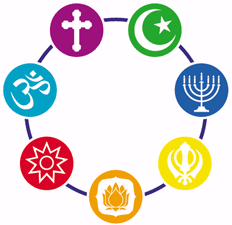
Southampton Council of Faiths - Sikhism
What is a Sikh?
A Sikh faithfully believes in one Immortal Being, the ten Gurus, from Guru Nanak Dev to Guru Gobind Singh, the Guru Granth Sahib, (the utterances and teachings of the ten Gurus) and the baptism bequeathed by the tenth Guru, and owes no allegiance to any other religion.
The Birth of the Khalsa gives the Sikh his identity. Khalsa means the community of the pure.
The physical symbols that denote a Khalsa Sikh are the five Ks.
-
The Kesh Long, uncut hair, a symbol of spirituality.
-
The Khanga a comb, a symbol of cleanliness and orderliness.
-
The Kara a steel bracelet worn on the right wrist as a reminder to be self-controlled.
-
The Kurpan A double edged ceremonial sword, a symbol of dignity and the struggle against injustice.
-
The Kachera Knee-length under shorts worn as a symbol of self-control and chastity. Khalsa Sikhs are the heart of Sikhism.
What does a Sikh believe?
Sikhs believe there is only one God, he is the Creator, Sustainer and Destroyer and has no human form. The goal of human life is to break the cycle of births and deaths and merge with God. This is accomplished by following the teachings of the Guru, meditation on the Holy Name and performance of acts of service and charity.
Sikhs reject rituals such as fasting, religious vegetarianism, pilgrimages, superstitions, yoga and idol worship.
The Sikh Holy Book (Guru Granth Sahib) is the perpetual Guru, there is no place in Sikhism for a living Guru today. Sikhism rejects all distinctions of caste, creed, race or sex.
How does a Sikh worship?
Sikhs sit on the floor or stand to worship.
In the gurdwara worship takes the following shape:
Ceremonial opening of the Guru Granth Sahib, Kirtan, (exposition of scriptures), recitation of Anand Sahib (The Book of Complete happiness composed by the third Guru), the Ardas (basic religious activity of Sikhs), the raising of Fateh slogan and then the slogan Sat Sri Akal (basic greeting of goodness) and taking the Hukam (reminder to live by Gods order). The Divine Will is responsible for the creation, sustenance and dissolution of Man and the Universe. Whatever happens is by His Will. Hukam takes the form of Natural Laws or Universal axioms. All the parts of the Universe are under His control.
How does a Sikh live?
A Sikh seeks to live by daily devotion to the remembrance of God.
Honest labour and work (Karat Karna) are the approved way of living ones life as a Sikhand sharing social responsibility with others.
Seva, community service is also an intergral part of Sikhism. The free community kitchen (langar) found at every gurdwara and open to people of all religions is one expression of this community service.
The Gurus stress the full equality of women.
Who leads Sikhs?
Sikhs do not have a trained priesthood, and appoint Khalsa to lead worship. Gurdwaras are managed by elected committees. Avatars (leaders and teachers) arise in the communities and are given authority by those who follow them.
Sikh Festivals
January - Birthday of Guru Gobind Singh Sahib
January - Maghi
March - Hola Mohalla
March - New Years begins
April - Vahsaki
June - Martyrdom of Guru Arjan Dev Sahib
September - 1 First Parkash Guru Granth Sahib
October - Installation of Holy Scriptures as Guru Granth Sahib
November - Diwali
November - Guru Nanak Jayanthi
November - Martyrdom of Guru Tegh Bahadur Sahib



Useful Links
Faith in Your city - Meridian TV - http://www.youtube.com/watch?v=PYN5WKuDnDY
BBC web site - http://www.bbc.co.uk/religion/religions/sikhism
Singh Sabha - http://www.singhsabhasouthampton.co.uk
Nanaksar - http://www.nanaksargurdwara.org/
Local Contacts
Gurdwara Nanaksar - 023 8022 6464
Gurdwara Guru Tegh Bahadur - 023 8039 3440
